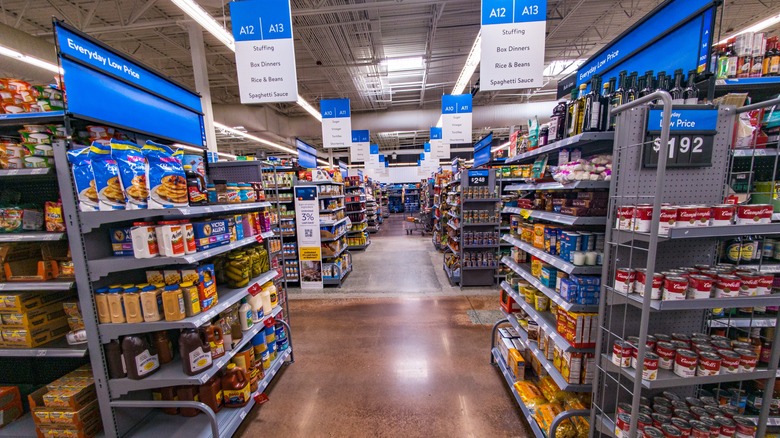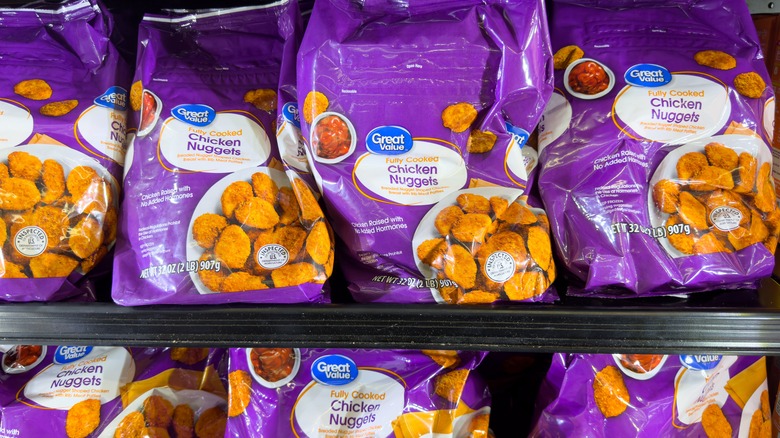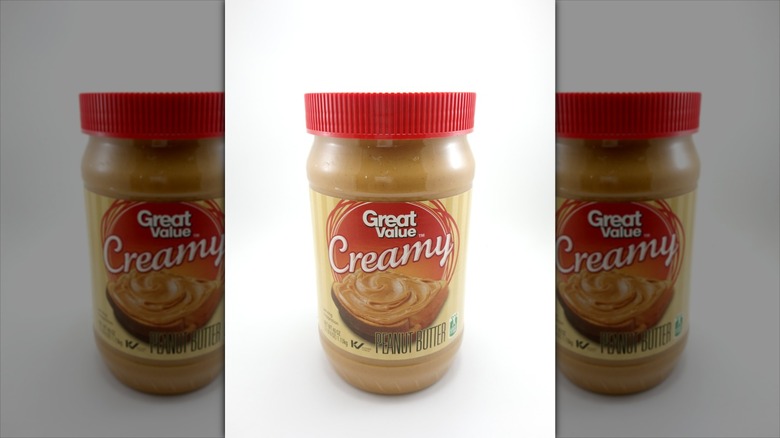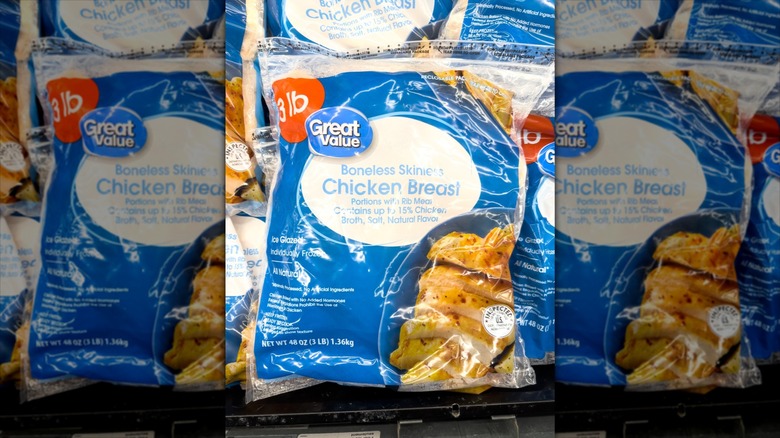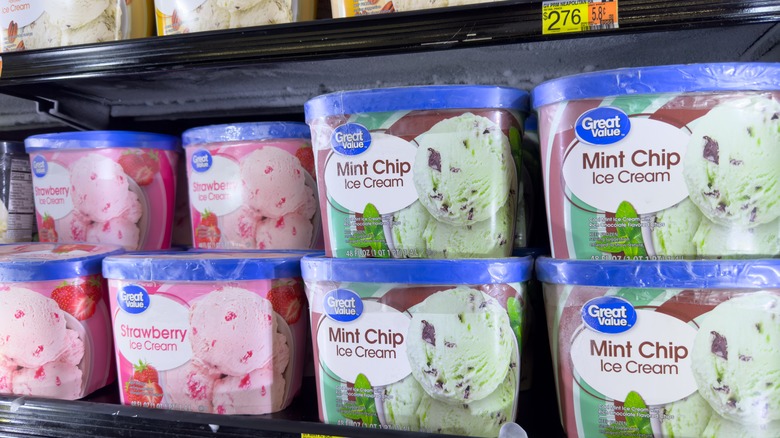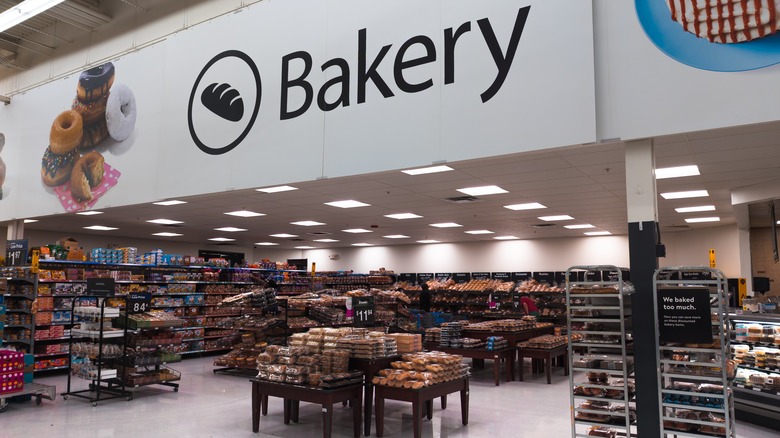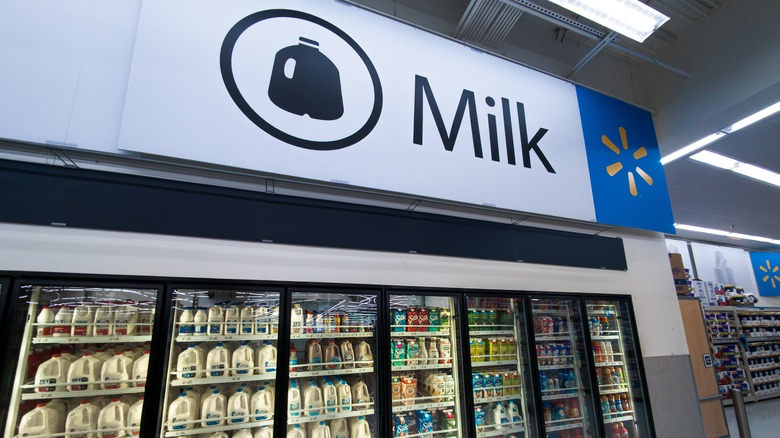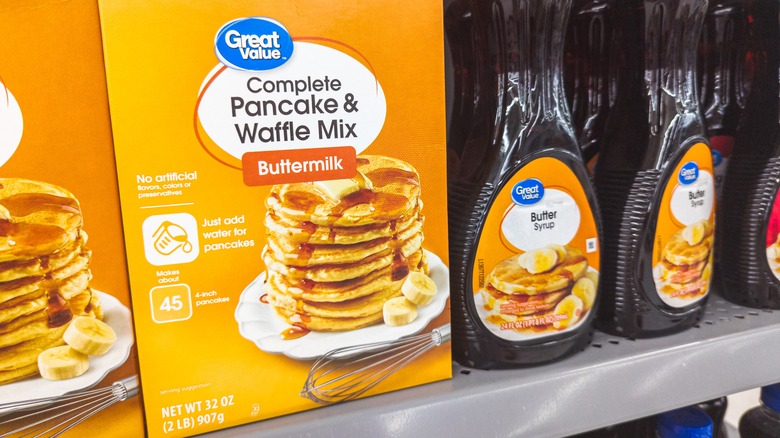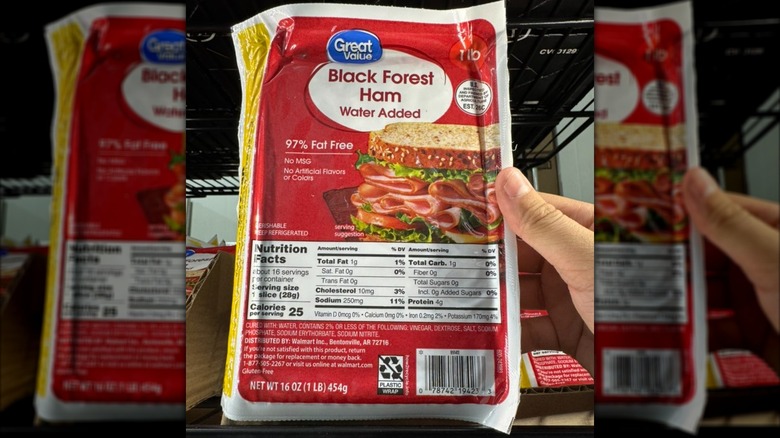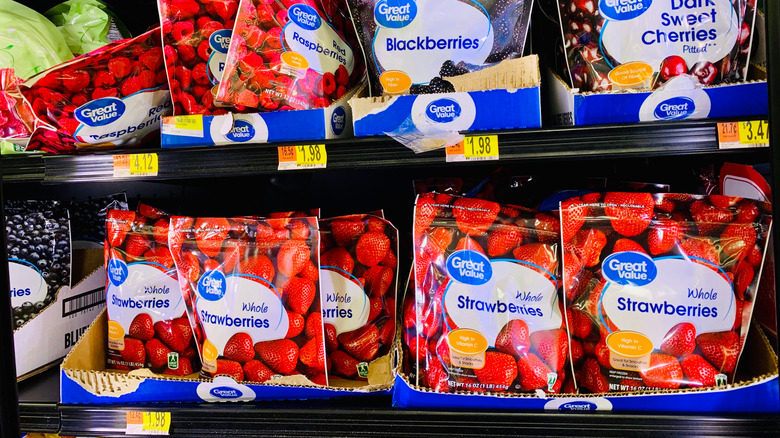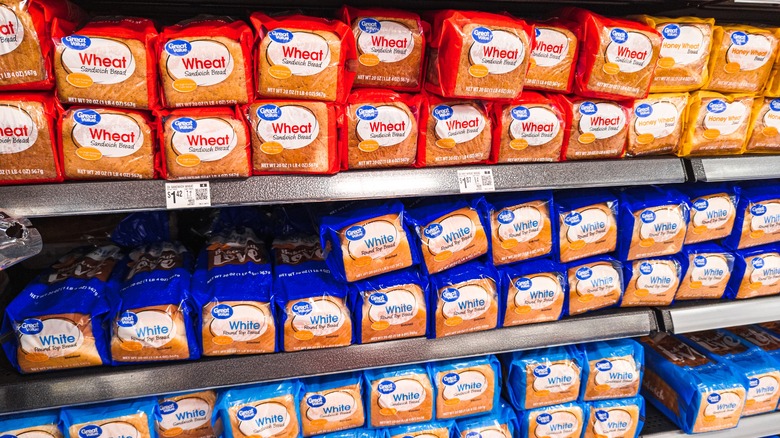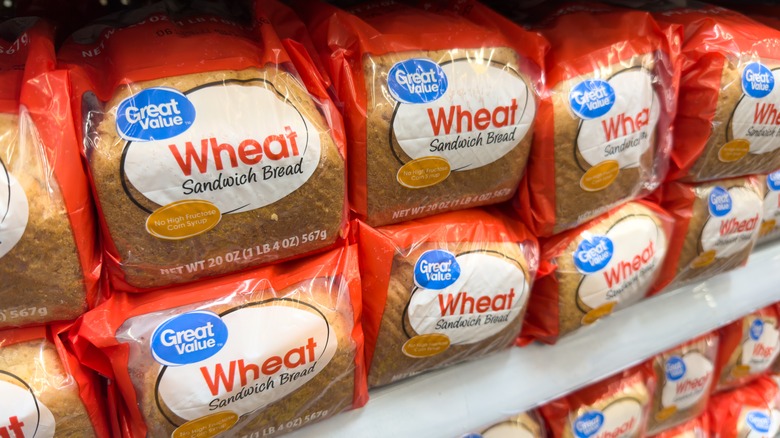The Big Names Hiding Behind Walmart Great Value Products
What kind of grocery shopper are you? While some customers fill their carts with name brands like Nabisco and Yoplait, others swear their favorite store brand labels offer bread, meat, and ice cream that's just as tasty for a fraction of the price. That debate is alive and well at Walmart, where the Great Value brand has competed head-to-head with more expensive options since 1993.
Store brands in the U.S. sold $271 billion worth of goods in 2024, an all-time record. These private labels are often produced by the same companies that make national name brands. Large manufacturing companies partner with chains such as Walmart to produce their store-branded groceries by using excess factory capacities. Walmart can also use smaller manufacturers that focus on specific product types to make its foods at a lower cost.
Walmart has more than 30,000 private label products across 20 categories, including groceries, prepared foods, clothing, home products, and more. And while the retailer keeps most of its partnerships with larger brands hush-hush, there are ways to find out which companies are behind the likes of Great Value salsa, peanut butter, and milk. We're here to put the rumors to rest and find out which companies actually make these popular Great Value products.
Perdue Farms
You can find rumors all over the internet about which companies make which products for Walmart. The truth is that the retailer likely has numerous different contracts with big companies for canning its vegetables and grating its shredded cheese. Reddit users who work in the manufacturing industry claim that the same products on their assembly lines get packaged into different bags — one with a store brand label, the other with a name brand. Others say that the recipes for certain foods are slightly different between name-brand and generic products, but are made by the same company in the same factories.
Most of these agreements are confidential, but one of the ways to find official confirmation about which parent companies produce which Great Value products is through recall notices. That's how some have connected Great Value chicken nuggets and Perdue Farms. When a company announces a recall, it lists all of the brands and products that might be affected. In many cases, you'll see name-brand and generic items listed together, meaning they were created either in the same factory, with the same ingredients, or perhaps both, depending on the situation. In 2010, Perdue Farms recalled bags of frozen Great Value chicken nuggets sold in Rhode Island. No other products were included in the recall — and there's a chance Walmart could have switched manufacturers in the years since — but the recall creates a solid link between the two companies.
Conagra
Conagra is one of the largest manufacturing companies in the United States, and its portfolio includes brands such as Marie Callender's, Slim Jim, Hunt's, and Duncan Hines. According to a couple of previous recalls, the manufacturer also creates products for generic brands. One of those recalls included a batch of salsas manufactured by Conagra. The company recalled a range of mild, medium, and hot Great Value salsas in 2013 for potentially containing plastic fragments.
The company was also at the center of another major food recall in Walmart history. In 2006, Salmonella Tennessee contamination forced the recall of multiple batches of Peter Pan and Great Value peanut butters. The tainted spreads were recalled nationwide, but not before infecting at least 625 people across 47 states. The Peter Pan and Great Value peanut butters were both created at a single plant in Georgia. In 2016, a ConAgra subsidiary was ordered to pay more than $11 million after pleading guilty to shipping contaminated food — the largest food safety criminal fine ever assessed in the U.S. at the time.
It's unlikely that Conagra still creates Great Value peanut butter for Walmart, however. In 2020, Conagra sold its Peter Pan line to Post Holdings (the company known for its cereals) in a deliberate move to stop making private label peanut butter. That said, given the size and range of products Conagra produces, we wouldn't be surprised if it has a few more Great Value items on its factory lines.
Tyson Foods
Tyson Foods creates a variety of its own branded chicken products to distribute nationwide. However, the company also packages chicken for Walmart. According to the USDA, Tyson operates under a number of DBAs ("doing business as"), including Walmart's Great Value brand. (For what it's worth, the company also packages products for Aldi, Costco, Kroger, Publix, Target, and more.)
Good news if you purchase Great Value poultry: There aren't any recent recalls listing Great Value chicken products. That also means it's unclear if Tyson packages all of Walmart's chicken, or just some of what's available. However, Walmart employees on Reddit have alleged that the Great Value chicken breasts and other products come directly from Tyson. One user, a former Tyson employee, claimed they would switch out the Tyson-branded packages for the Great Value bags, with the same chicken coming down the conveyor belt. "They didn't change what was coming down the line," they wrote on Reddit. "They are exactly the same [product]!"
Wells Dairy
Though most agreements for producing Great Value products are very cloak-and-dagger, Walmart openly shares that Wells Dairy (officially known as Wells Enterprises) has spent over 30 years as the company behind all of its Great Value ice cream. You might not recognize the Wells Dairy name immediately, but you likely have spotted its other brands in the freezer aisle, such as Blue Bunny, Halo Top, Bomb Pop, and Blue Ribbon.
Great Value ice cream racks up pretty impressive reviews. In fact, ice cream fans have rated Great Value vanilla ice cream over the same product from Blue Bunny, despite typically never buying generic ice cream. That could mean a cost savings since Great Value ice cream sells for around $3 in Walmart stores (the exact price will vary depending on the location), while Blue Bunny retails at over $4 for the same size container.
Generic ingredients can be cheaper than name-brand counterparts because they don't have fancy packaging. Another explanation for their comparative affordability is their ingredient list. In this case, the Blue Bunny brand has a simple list that consists of milk, cream, skim milk, sugar, egg yolks, natural flavors, and vanilla bean specks. Great Value's version contains most of those ingredients but adds several more, including corn syrup, buttermilk, whey, carrageenan, and cellulose gel and gum. This recipe likely allows Wells Dairy to stretch the more expensive ingredients while making a batch of ice cream that customers still want to eat.
The J.M. Smucker Co.
Colloquially known as Smucker's, this grocery goods behemoth produces a huge array of grocery store name brands, including JIF peanut butter, Folgers coffee, Smucker's jams, and the Hostess line of cakes and other sweet treats. (Twinkie, anyone?)
With manufacturing plants across the nation, it shouldn't be a surprise that Smucker's uses its processing power to create products for generic labels, too. The company could produce any number of Great Value products since it has experience making everything from the increasingly popular Uncrustables to pet food. That said, we know for sure that Smucker's produces a number of baked goods for the Walmart store brand, since they were the company behind a nationwide recall in 2024.
The recall included more than 40,000 packages of Great Value cheese danishes and cinnamon rolls sold in Walmart bakery departments. The reasoning given was for potential pieces of plastic in the products. Not a great way to start your breakfast.
Danone
Like many large food manufacturers, French-based Danone has an international presence. The company operates factories in the U.S. to make popular products like Danone yogurt and Silk milk options, and considers itself the global leader in dairy products and their plant-based alternatives. With a portfolio that includes Activia, Alpro, and International Delight, among others, it's not difficult to see why the company has such a large presence in the U.S. and beyond.
In 2024, Danone issued a recall for 15 types of Silk milk produced and sold in Canada, including almond, coconut, oat, and cashew varieties. The recall also included three types of almond milks sold in Walmart stores under the Great Value name. The recall affected stores nationwide for a possible listeria outbreak, and the Great Value products had the same best-before dates as most of the Silk products, suggesting they were made around the same time.
A similar recall didn't affect these products for U.S. customers of Silk and Great Value products. As a result, it's not a guarantee that Danone also makes the Great Value almond milks for Walmart stores stateside. However, given the proximity and close ties to the country next door, it's not out of the question.
The Krusteaz Company
Known for its assortment of muffin, cornbread, and pancake mixes, the Krusteaz brand is a staple when it comes to easy baking. In fact, we ranked it as the No. 2 best brand for pancake mixes — no small feat given the prevalence of larger brands competing for a spot in the baking aisle.
Walmart shoppers who want delicious Saturday morning pancake breakfasts at a lower cost might be pleased to know that Krusteaz is also the company behind the assortment of Great Value pancake mixes. In 2022, the company recalled one lot of the Great Value Buttermilk pancake and waffle mix. (The company went by Continental Mills at the time but changed its name later that year to reflect the company's flagship brand.)
In many cases, when a larger brand produces generic products, the recipes are altered so that the generic brand is cheaper to make, and therefore cheaper in stores. The ingredient lists between the Krusteaz Light and Fluffy Buttermilk Complete Pancake and Waffle Mix and the Great Value version are almost identical, however. The main difference is that dextrose, a type of sweetener, is listed higher in the list for the Krusteaz version, which also lists modified food starch as one of its components, while Great Value does not. Great Value's version lists natural flavor at the end of its list. A taste test might prove these mixes are virtually indistinguishable, especially if you want to save over $1 by buying the generic version.
JBS
You might not recognize the name JBS, but chances are you'll recognize several of the brand names within its portfolio. The company relies heavily on its meat sourcing, particularly beef, as evidenced by its brand lineup of Certified Angus Beef, Blue Ribbon Beef, Primo, and Riverview Farms brands.
The company has facilities across the globe, with 110 locations in the U.S. alone. At least some of those locations produce Great Value products. In 2022, JBS recalled Great Value Black Forest Ham with added water for potentially being undercooked.
More controversially, Walmart was linked with JBS in 2021 when an investigation by The Guardian found that the grocery chain (along with Costco and Kroger) was selling Brazilian beef sourced by a JBS subsidiary, Sampco. Cattle raised in Brazil for beef consumption are a known driver for deforestation thanks to the sheer amount of land cleared for the process, and JBS had already been linked to the destruction of the Amazon rainforest in the past.
Willamette Valley Fruit Company
As much as we'd like to believe that all of the fruit from the Willamette Valley Fruit Company comes from its namesake picturesque region in Oregon, a 2023 recall of several brands of frozen fruit revealed that simply isn't the case. The recall included several batches of frozen strawberries or mixed fruit containing strawberries. The main problem was potential Hepatitis A contamination of those strawberries, which were grown in Mexico.
Willamette Valley Fruit Company produced multiple types of frozen fruit blends for Walmart under the Great Value name, including sliced strawberries, mixed fruit, and an antioxidant blend. Interestingly, the same fruit was also used in other frozen fruit blends for the Rader Farms Organic brand, sold in HEB and Costco locations.
It shouldn't come as a big surprise that Willamette Valley Fruit Company doesn't source all of its fruit from its namesake valley. Labor costs for farming in Mexico are typically cheaper than in the U.S., which means a brand can sell its products for less at the grocery store. If you're curious about where the fruit you're buying is coming from, each package (regardless of brand) is required by the USDA to include its country of origin.
Bimbo Bakeries
One of the biggest companies rumored to produce Great Value products is Sara Lee, the giant brand behind popular loaves sold in stores nationwide. It's more accurate to say the company behind the manufacturing is Bimbo Bakeries, whose owner, Grupo Bimbo, operates in 35 countries around the world. Top brands that fall under Bimbo Bakeries include Ball Park, Arnold, Entenmann's, Little Bites, and, yes, Sara Lee.
Store-bought bread is a divisive topic on Reddit, where some customers say the generic Great Value loaves are dry and crumbly, while others swear they're just as good as name-brand slices. One former Sara Lee employee shared that the factory they worked at produced both lines and didn't change the recipes very much. "The differences between Sara Lee White and Great Value are minuscule," they wrote on Reddit. "It would cost too much to change too much between the different brands to be profitable."
One recall linking Bimbo to Great Value products occurred in 2013, when the company announced that metal fragments might have gotten into packages of hamburger buns from faulty manufacturing equipment in a North Carolina factory. In 2015, the company announced a much larger recall of breads under the Sara Lee, Great Value, and other brands, when a broken light bulb in a factory led to small pieces of glass on top of some loaves.
Wonderbrands
Though Walmart clearly works with Bimbo for a large portion of its fresh-baked products, at least in the U.S., the grocery chain has contracts with other companies as well. In Canada, for example, Walmart is linked with Wonderbrands, which is most famous for its loaves of Wonder Bread. Those loaves are also available stateside, where Wonder Bread is owned by Flowers Foods, while Wonderbrands also makes bakery products for brands such as D'Italiano, Country Harvest, and Casa Mendosa.
In 2024, Wonderbrands recalled numerous cases of bread loaves and hamburger buns after discovering they might contain metal fragments. The recall was extensive and included most of the company's brands — including five variations of Great Value breads. Wonder Bread and Great Value's loaves of white bread both performed poorly in our ranking of grocery store white breads, although it's notable that Wonder Bread has reworked its recipe in Canada to eliminate artificial preservatives. The same might be true for its Great Value recipe there, too, which would be a win all around for cost-conscious shoppers.
